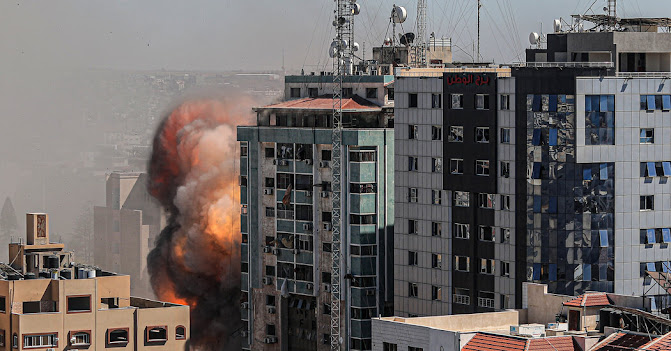Arab world condemns Israel’s bombardment of Gaza but not beyond words
The Arab world has broadly condemned Israel’s bombardment of Gaza and Israeli police raids this week on the grounds of Jerusalem’s Al Aqsa Mosque, one of Islam’s holiest sites. Leaders have spoken out, protests have taken place, social media is aflame.
But at the government level, the condemnation so far is largely rhetorical. Since 2014, when Israel mounted a seven-week offensive into Gaza, the region’s concerns have shifted, with new fears about Iran’s influence and a growing recognition by Arab nations of the reality of Israel.
The escalation of violence has put a great strain on those governments, which had argued that their closer relationship with Israel would help restrain Israeli actions aimed at Palestinians, especially the governments that normalized relations with Israel including the United Arab Emirates, Bahrain, Sudan and Morocco.
“I have not seen any Arab state that has not expressed support for the Palestinians on a rhetorical level, and it would be very difficult for them to say anything otherwise,’’ said H.A. Hellyer, a scholar of Middle East politics at the Carnegie Endowment in Washington. “But what they do about it is very different.’’
Hamas, the militant Islamist group that controls Gaza, is little loved by governments in the Sunni Arab world, but its loud messaging that it was firing rockets at Israel in defense of Jerusalem struck a chord, said Khaled Elgindy, director of the Palestine program at the Middle East Institute. Gaza is one thing, he said, but “Jerusalem is important for the Arab League and for clear stakeholders, like the Jordanians and the Saudis,’’ who are the guardians of the holy places of Islam.
Egypt and Jordan, which have long had diplomatic relations with Israel, are deeply engaged in trying to de-escalate the conflict, but also must be wary of domestic public anger. Qatar, which bankrolls Hamas in Gaza, has also tried to mediate; its foreign minister has held talks with both the Hamas leader, Ismail Haniyeh, and the U.S. national security adviser, Jake Sullivan.
The Arab League is pressing for an emergency debate in the U.N. Security Council, which the United States has put off until at least Sunday. The Arab League needs to keep in front of the debate on Jerusalem, the analysts agreed, and not cede the field to Hamas.
Meanwhile, when Iran realized Palestinian fighters’ only problem was lack of access to weapons it has provided material support to Hamas.
“With divine guidance and assistance, we planned, and the balance of power has been transformed in Palestine, and today the Gaza Strip can stand against the aggression of the Zionist enemy and defeat it,” said Iran's Supreme leader Ayatollah Khamenei.




Comments
Post a Comment